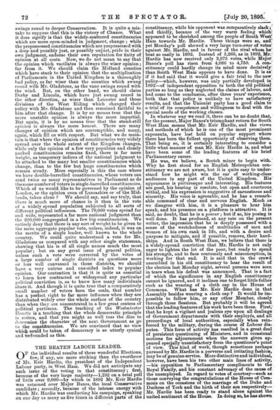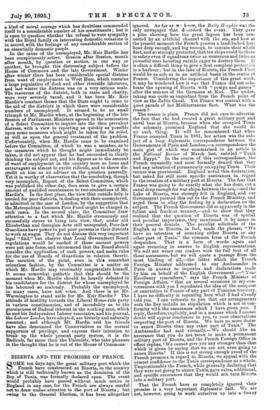THE BEATEN LABOUR LEADER.
OF the individual results of these wonderful Elections, few, if any, are more striking than the overthrow of Mr. Keir Hardie, the president of the Independent Labour party, in West Ham. We did not anticipate any such issue of the voting in that constituency; first, because of the very large majority-1,232 on a total poll of little over 9,000—by which in 1892 Mr. Keir Hardie was returned over Major Banes, the local Conservative candidate ; secondly, because of the intense energy with which Mr. Hardie was conducting his campaign, speaking on one day as many as five times in different parts of the constituency, while his opponent was comparatively slack ;! and thirdly, because of the very warm feeling which' appeared to be cherished among the people of South West! Ham towards Mr. Hardie. These things were so, and yet Monday's poll showed a very large turn-over of votes' against Mr. Hardie, and in favour of the rival whom hel beat so easily in 1892. Instead of 5,268, as in 1892, Mr.' Hardie has now received only 3,975 votes, while Major Banes's poll has risen from 4,086 to 4,750. A con.' stituency could hardly change its mind more decisively than South West Ham appears to have done. It is as if it had said that it would give a fair trial to the new policy—which, however, was only partially developed in 1892—of independent opposition to both the old political' parties so long as they neglected the claims of labour, and had come to the conclusion, after three years' experience, both that that policy is unlikely to have satisfactory. results, and that the Unionist party has a good claim to a trial of its competence and willingness to deal with the special needs of the working classes.
In whatever way we read it, there can be no doubt that, for the present, Major Banes's triumphant return for South West Ham means that Mr. Keir Hardie, and the views and methods of which he is one of the most prominent exponents, have lost hold on popular support where there has been the fullest opportunity of observing them. That being so, it is certainly interesting to consider a little what manner of man Mr. Keir Hardie is, and what have been some of the leading features of his brief Parliamentary career. He was, we believe, a Scotch miner to begin with.' Why he first stood for an English Metropolitan con- stituency we are not aware, but it is quite easy to under- stand how he might win the ear of working-class audiences in any part of the United Kingdom. His appearance is picturesque and interesting. His features are good, his bearing is resolute, but open and courteous withal, and his expression is suggestive of earnestness and.' sincerity. His voice is agreeable, and he has a remark- able command of clear and nervous English. Much as we disagree with him, it is a pleasure to hear him speak, and his presence on a platform is attractive. It is said, no doubt, that he is a poseur ; but if so, his posing is well done. It has produced, at any rate on the present writer, the impression that he is deeply possessed with a sense of the wretchedness of multitudes of men and women of his own rank in life, and with a desire and purpose to mitigate, and if possible, remove, their hard- ships. And in South West Ham' we believe that there is a widely-spread conviction that Mr. Hardie is not only eager to lighten the lot of the poor, but ready to spend. his strength, and to face contumely and misconception, in working for that end. It is said that in the crowd assembled in his old constituency to hear the result of the election last Monday night, several persons were seen in tears when his defeat was announced. That is a fact of which the significance in any English constituency cannot be ignored, and it inclines one to forget little follies such as the wearing of a cloth cap in the House of Commons. What has Mr. Keir Hardie done in that Assembly besides wearing a cloth cap ? It would be im- possible to follow him, or any other Member, closely through three Sessions. But probably it will be agreed. that the leading features of his work have been three. First,' that he kept a vigilant and. jealous eye upon all dealings of Government departments with their employs, and all proceedings of local authorities, especially when rein- forced by the military, during the course of Labour dis- putes. This form of activity has resulted in a great deal of persistent questioning of Ministers, and in occasional motions for adjournment when the answers given ap- peared specjally unsatisfactory from the questioner's point of view. This kind of work, though sometimes perhaps pursued by Mr. Hardie in a perverse and irritating fashion, may be of genuine service. More distinctive and individual, however, have been his two other main lines of activity, —his opposition to Parliamentary compliments to the Royal Family, and his constant advocacy of the cause of the unemployed. In regard to votes of courtesy—such as those conveying the congratulations of the House of Com- mons on the occasions of the marriage of the Duke and Duchess of York and the birth of their son respectively— Mr. Hardie has been ready to stand alone against the united sentiment of the House. In doing so, he has shown a kind of moral courage which has doubtless commended itself to a considerable number of his constituents ; but it is open to question whether the refusal to vote sympathy with the Royal family on interesting domestic occasions is in accord with the feelings of any considerable section of an essentially domestic people. In the cause of the unemployed, Mr. Keir Hardie has been conspicuously active. Session after Session, month after month, by question or motion, in one way or another, he brought this distressing subject before the House of Commons and the late Government. Winter after winter there has been considerable special distress from want of employment in West Ham, which contains a large population of dock and other riverside labourers, and last winter the distress was on a very serious scale. The resources of the district, both in rates and charity, were very severely taxed, and it has been Mr. Keir Fardie's constant theme that the State ought to come to the aid of the districts in which there were considerable numbers of unemployed. It seemed to be no small triumph to Mr. Hardie when, at the beginning of the late Session of Parliament, Ministers agreed to the nomination of a Select Committee to inquire into the then prevalent distress, with a view to reporting as quickly as possible upon some measures which might be taken for its relief, as well as upon the general treatment of the problem. Unfortunately, when Mr. Hardie came to be examined before the Committee, of which he was a member, as to the measures which he thought might immediately be taken, it did not appear that he had succeeded in clearly thinking the subject out, and his figures as to the amount of want of employment in the country were so loose and extravagant as almost to excite ridicule, and to throw dis- credit on him as an adviser on the question generally. Yet it is worthy of observation that the concluding, though very incomplete, Report of the Select Committee, which was published the other day, does seem to give a certain amount of qualified countenance to two contentions of Mr. Hardie's. In the first place, the view that outside help is needed for poor districts, in dealing with their unemployed, is admitted in the case of London, by the suggestion that the Metropolitan Common Poor Fund might be charged in such cases. In the second place, the Committee draw attention to a fact which Mr. Hardie strenuously and successfully strove to bring into view, that, under old Elizabethan and Georgian Acts still unrepealed, Poor-law Guardians have power to put poor persons in their districts to work at wages. They do not discuss this very important legal "find," but observe that Local Government Board regulations would be needed if these ancient powers were put into force, and recommend that the Board should consider the application of such powers, and make rules for the use of Boards of Guardians in relation thereto. The mention of the point, even in this somewhat colourless fashion, by the Committee is a matter on which Mr. Hardie may reasonably congratulate himself. It seems somewhat pathetic that this should be the moment when Mr. Hardie should be heavily defeated in his candidature for the district for whose unemployed he has laboured so zealously. Probably the unemployed, in many cases, have not votes. And there is no Mr. Warmington to stand aside for Mr. Keir Hardie ? The attitude of hostility towards the Liberal Home-rule party in various constituencies, and of incredulity as to the genuineness of Radical interest in the working man, which he and his Independent Labour associates, and his journal, the Labour Leader, have adopted, are bitterly and naturally resented ; and although Mr. Hardie and his friends have also denounced the Conservatives as the normal supporters of privilege, and express their intention to break up the whole present party system, it is the Radicals, far more than the Unionists, who take pleasure in the thought that he is out of the House of Commons.



































 Previous page
Previous page